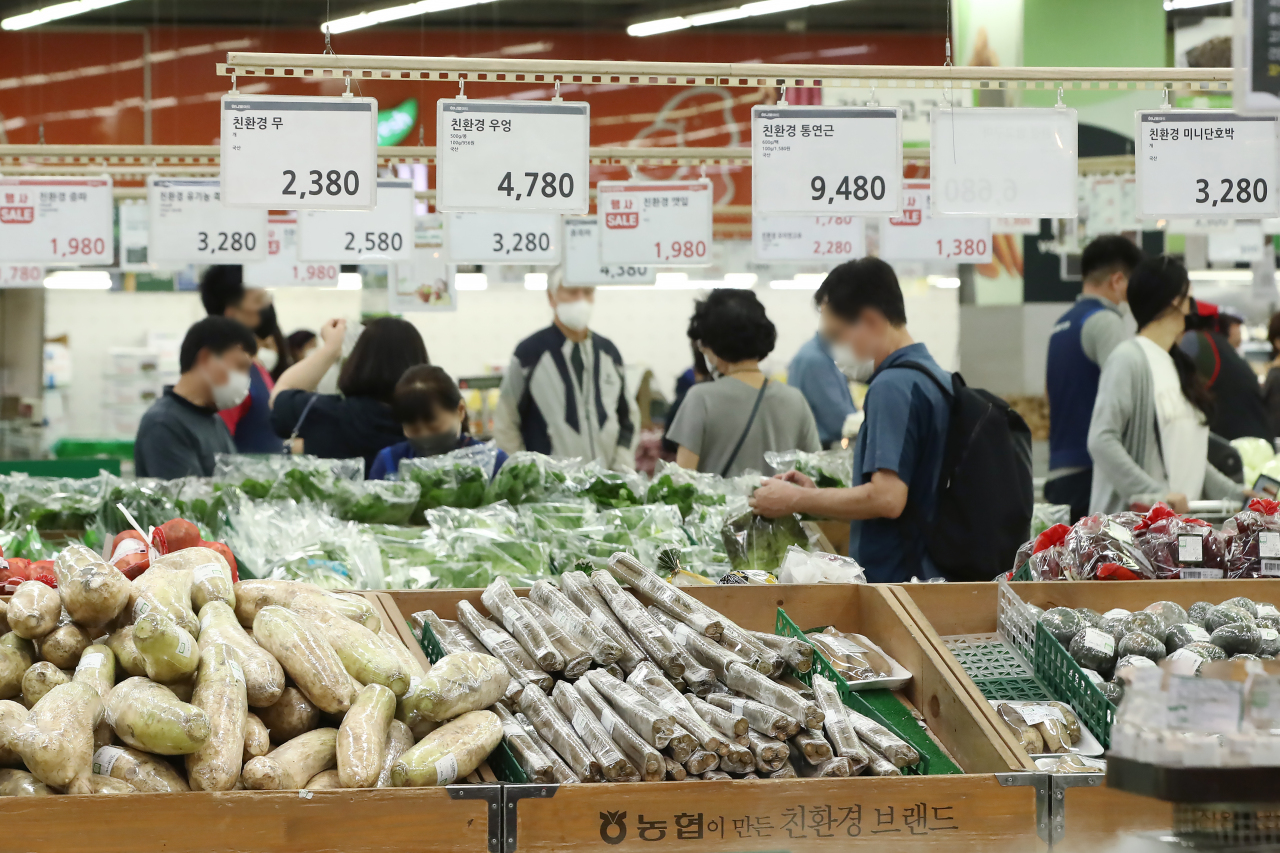 |
Citizens shop for groceries at a discount store in Seoul on Sunday. (Yonhap) |
South Korea's consumer prices grew more than 2 percent for the sixth consecutive month in September, due largely to high oil prices, data showed Wednesday, indicating a build-up of inflationary pressure amid an economic recovery.
The consumer prices rose 2.5 percent in September from a year earlier, slowing from a 2.6 percent on-year gain in August, according to the data compiled by Statistics Korea.
Compared with a month earlier, consumer inflation rose 0.5 percent last month.
Core inflation, which excludes volatile food and oil prices, rose 1.5 percent on-year last month, the highest since October 2017.
The country's inflation has been under upward pressure as the economic recovery accelerates.
The Bank of Korea (BOK) raised its 2021 inflation outlook to 2.1 percent from its earlier estimate of 1.8 percent. The BOK aims to keep annual inflation at 2 percent over the medium term.
"The latest gains of consumer prices were mostly led by hikes in prices of personal services, as well as farm and oil products.
Prices of processed food products also rose," Eo Woon-sun, a senior Statistics Korea official, told reporters.
Prices of agricultural, livestock and fishery products continued to extend their gains, but the growth markedly slowed from August. Prices of those products increased 3.7 percent on-year, slowing from a 7.8 percent gain in August.
Prices of petroleum products jumped 22 percent on-year as oil prices remained high amid the global economic recovery. Prices of industrial products grew 3.4 percent on-year, the fastest in more than nine years.
Those of processed food products gained 2.5 percent last month, faster than a 2.3 percent on-year rise in August.
Recently, a hike in milk prices jacked up prices of dairy products, and processed food products, such as instant noodles and ready-to-eat rice, also climbed.
Home prices increased 1.7 percent last month, marking the 17th straight month of rises. Housing prices extended their gains despite the government's efforts to curb them.
Prices of daily necessities, -- 141 items closely related to people's daily lives, such as food, clothing and housing -- climbed 3.1 percent on-year in September.
The statistics agency said upward pressure on inflation appears to outweigh downward pressure down the road.
"Prices of personal services will likely extend their gains amid improving consumer sentiment. Prices of processed food products and industrial goods are expected to rise, and a hike in the electricity rate is also planned," Eo said.
Consumer prices are expected to grow at a faster pace in October due to last year's lower base, according to the finance ministry. The government offered one-off state subsidies for mobile phone bills in October last year, which helped slow down inflation growth.
The Korea Electric Power Corp., South Korea's state-run utility firm, said last month it plans to increase the electricity rate in the fourth quarter to reflect hikes in prices of raw materials.
On top of the planned raise in the electricity bill, the government's massive fiscal spending is also expected to act as upward price pressure.
The government said it will make efforts to freeze public utility and transportation bills by the end of this year to help ease inflationary pressure.
The continued growth of price pressure is likely to give the BOK room to consider a further rate hike, experts said.
The BOK raised the benchmark interest rate in August by a quarter percentage point to 0.75 percent from a record low of 0.5 percent, marking the first pandemic-era rate hike.
BOK Gov. Lee Ju-yeol hinted that the central bank may again raise the key rate this year or early next year.
Asia's fourth-largest economy is on a recovery track on the back of solid exports despite the latest uptick in COVID-19 cases.
The BOK kept its 2021 growth outlook for the South Korean economy at 4 percent. The government forecast the economic growth of 4.2 percent for this year. (Yonhap)








